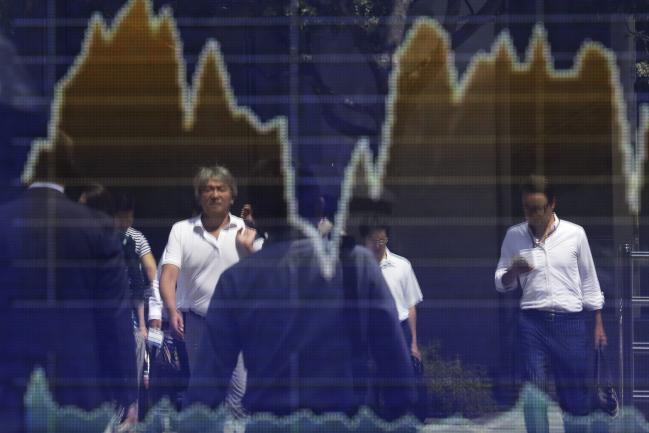(Bloomberg) -- In Asia, there’s a sense of tranquility in the air -- the equity trading air, that is. Stock markets are up for a third day in a row, setting the scene for the first monthly gain since July.
Volatility on the MSCI Asia Pacific Index has been on a downward trajectory and is currently sitting at a level not seen in seven weeks -- basically before the major sell-off that happened in the U.S. Chinese assets have also been the calmest in months: the yuan is the least volatile since December, and the Shanghai Composite Index is the most placid since May.
So where’s this sense of peace coming from? Simple: the big dinner that Donald Trump and Xi Jinping will have on Saturday in Buenos Aires. That’s really what everyone’s waiting for. This marks a pivotal moment in the escalating trade war between the world’s two largest economies.
But before you get your hopes up, it’s worth mentioning that some investors are staying cautious ahead of the big day. To Ronald Wan, chief executive at Partners Capital International Ltd., investors don’t have big expectations for a major breakthrough at the meeting.
“The slightly-better performance in some markets lacks fundamental support,” he said, adding that the absence of development in trade so far has contributed to the low-volatility environment. “Investors aren’t convinced that the market will make a turnaround.”
Larry Kudlow has said the U.S. president is hopeful for a breakthrough with Xi, but reiterated that he is ready to impose more tariffs if the upcoming talks don’t yield progress.
READ: Trump-Xi Meeting Puts Emerging Markets on Pain-or-Pleasure Watch
There are also other overhangs in the market and among them, interest-rate decisions are front and center. A slew of comments from Fed officials came through overnight:
- Vice chairman Richard Clarida backed further gradual rate increases and called risks “less skewed to the downside.”
- St. Louis President James Bullard was more cautious, telling Reuters that officials must monitor possible “cracks” in the U.S. recovery.
- Chicago’s Charles Evans echoed the call to get to more neutral policy.
- Atlanta’s Raphael Bostic noted “pockets of distress” in his district.
- Kansas City’s Esther George said that while her region was doing well overall, the China trade dispute isn’t helping.
There’s no doubt these mixed but generally in-line comments and Trump’s tirade with the Washington Post saying he’s “not even a little bit happy” with Fed Chairman Jerome Powell will put the central-bank chief’s Wednesday speech under the spotlight.
Here are more overnight events:
- U.S. stocks gained for a second day, with the S&P 500 Index closing up 0.3 percent after swinging between gains and losses.
- U.K. Prime Minister Theresa May has backed down in a key Brexit battle with Parliament, ditching moves to stop lawmakers trying to re-write her plans, according to an official.
- A Bloomberg Economics gauge aggregating the earliest-available indicators showed China’s economy slowed for a sixth straight month in November.
And here are some notable movers in Asia:
- Dongwon Industries Gains After Announcing Shipping Investment
- Kao Rises Most Since Feb. on Development of New Fiber Technology
- Sumitomo Dainippon Pharma Climbs as Latuda Patent Cases Settled
- oOh!media Rises After 10-year Brisbane City Council Contract Win
- AMP Flirts With Fresh Record Low After Remediation Advice Update
Stock-Market Summary
- Japan’s Topix index up 0.5%; Nikkei 225 up 1%
- Hong Kong’s Hang Seng Index up 0.9%; Hang Seng China Enterprises up 0.9%; Shanghai Composite up 0.9%
- Taiwan’s Taiex index up 0.6%
- South Korea’s Kospi index up 0.3%; Kospi 200 up 0.4%
- Australia’s S&P/ASX 200 down 0.2%; New Zealand’s S&P/NZX 50 up 0.5%
- India’s S&P BSE Sensex Index up 0.7%; NSE Nifty 50 up 0.5%
- Singapore’s Straits Times Index little changed; Malaysia’s KLCI little changed; Philippine Stock Exchange down 0.2%; Jakarta Composite down 0.2%; Thailand’s SET up 0.3%; Vietnam’s VN Index little changed
